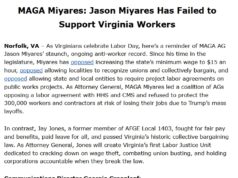The Interview
In an wide-ranging interview with conservative John Frederick, Virginia State Senator Chap Petersen illustrates how little Democrats have learned about building upon their own values to frame and argue their commentary. Democrats almost endlessly embrace the other side’s deceptive frames.
At the outset, let me say clearly that at the moment, we are not in a position to abandon natural gas in this county. But wantonly expanding the use of natural gas with reckless and widespread fracking is not the answer. In doing so, politicians and supporters of a runaway industry deny the very real negative impact on local aquifers and other bodies of water. They also ignore a host of other impacts of gas extraction, transportation,environmental degradation, and disruption. Apparent support for gas extraction has been built on the shoulders of expert industry propagandists. And most Americans, including most of our “leaders” have bought it hook, line and sinker.
Regarding the Mountain Valley Pipeline and the Atlantic Coast Pipeline, right-wing host John Fredericks said: “Obviously, the extreme left-wing environmental wackos going bananas over it; they go bananas over anything except wind, I would imagine.” Fredericks claims the pipelines would bring jobs. Ignoring the false claim of meaningful numbers of permanent new jobs, Chap first responds that perhaps he is one of those “wackos.” Note Chap’s embrace of this negative frame for environmentalists. Chap tries to briefly align himself with those who are pro-environment and then quickly abandons them. He tries to have it both ways. But this is not before Chap had attempted, earlier in the interview, to carefully align himself with conservatives on several other positions. But that’s a separate diary.
To assuage Democrats and those who care about controlling their own property, Chap says “you still have to respect people’s rights.” “You gotta pay people fair compensation.” That should go without saying, but it doesn’t in eminent domain cases, particularly in the fracking era. Initially, landowners are enticed to believe they can get rich. A few landowners might make a considerable sum. The rest reduced housing values and even, in numerous cases, suffer ruin. It gets worse. (Please follow below the fold…)
The gas pipelines under discussion are about much more than eminent domain, though that is extremely central to the various issues. The gas pipelines will take numerous homes throughout West Virginia, Southwest Virginia, and North Carolina. In Montgomery County the proposed Mountain Valley Pipeline cuts through a neighborhood. It is not believable that homeowners and others like them in multiple states will be made “whole.” But that is just the beginning of Chap’s failure to effectively frame the discussion.
We’ve seen that with Keystone XL, a tar sands oil pipeline (with some unique problems of its own) that will benefit few besides the Canadians, who own the tar sands; the Koch Brothers, who are behind the pipeline; and the Chinese who will get the oil. Keystone will put a critical aquifer at risk, but life-sustaining drinking water doesn’t matter to the Koch Brothers or their Republican allies. Too few Democrats really care either. They say they do, of course. But when the votes are in, they really don’t.
Propaganda “War” Begets the Frame
Now, Virginia and its neighbors are faced with “natural” gas pipelines, built in service of largely “fracked” gas for the benefit of few and also for export.
From the long-running “natural” gas ad campaign on TV, you wouldn’t know how dirty fracking is and how little benefit relative to cost there really is. Certainly Chap gives no indication he understands that. Perhaps Chap’s seen the ad too often and believed its propaganda?
Picture this (from one of the ads): On a pristine white-to-silver background, fracking wells, pads, pipelines appear almost immaculate. No smudge of any kind mars the benign, almost ethereal images. All of this leads the viewer to equate fracking with purity. It’s all “good.” There’s no hint of water pollution, the giant trucks destroying local roads, or the huge well pads which overwhelm homeowners and neighbors with constant 24-7 noise (so loud no one can sleep).
Former Fox-ite and soap actress Blake Alexander confidently struts across the white white background wearing a dark pantsuit and looking every bit the faux authority. She snaps her fingers and animation pops up with more supposed features of fracking. Following the suggestive imagery, she tells you outright how supposedly “clean” “natural” gas is. Schools, parks and other services pop up, as Alexander suggests that gas and oil companies provide all of this, never mind the same people are trying to shutter public education and many government services even as I write. That they have offshored most of their headquarters to evade taxes, have had massive tax cuts over decades, have gotten cuts to federal and state environmental resources administrations, and received huge depletion allowances is never mentioned. One of the ads even ends with fireworks in red, white and blue. It’s “American,” ‘like red, white and blue,” you know. Except that it isn’t. But it’s incredible propaganda. Bringing American ingenuity to solve climate change, environmental pollution, and water shortages would be worth celebrating. But here’s how Chap handles the Frederic propaganda.
Real Consequences of Buying into the Frame
Again buying the industry frame, Chap says that “natural gas” is “by and large a clean-burning fuel, so I celebrate that we have resources in natural gas.” Notice how Chap focuses on the burning of gas, but totally ignores the production, transport, and aftermath of such (including the environmental consequences of injecting millions of toxic chemicals into the earth). This GOP-industry-framed sleight-of-hand enables the propagandist to ignore completely the extractive process, its disruption to localities, and the in-perpetuity risk to the environment of injected chemicals injected in the wells to extracting the gas.
A single “frack” can take over a million gallons of water plus a chemical soup, the contents of which we are not allowed to learn. In North Carolina, under rules developed by the Mining and Energy Commission (which had not a single real environmentalist on it), it will be a crime for anyone to inform anyone else of the contents of the fracking chemicals (lest they discover what’s in them). And the “Halliburton Rule,” made by and for you-know-who, provides that frackers shall not be forced to disclose what the contents of fracking chemicals or the specifics of the process are. Those are, instead, conveniently (for the frackers) deemed “proprietary.”
Instead, the industry gets free rein to substitute their “benign” animation. So why don’t politicians supposedly on our side stand up for us by noting that if the process were so safe, why does it need the Halliburton Rule? And furthermore, why criminalize disclosure, if not to silence critics from speaking and preventing others from knowing the truth? When the extractive process is included in the equation, fracking is dirty and promotes climate change.
The fact is, the horizontal fracking process imperils aquifers and the water table. In North Carolina, for example, the shale is less deep than in other places and the shale actually “pierces” or protrudes into the aquifer. Extraction in such a sensitive environment will be disastrous. And yet the frack-crazed drillers and the get-rich-quick storytellers persist.
Note that the fracking process allows drilling currently to reach 1 to 2 miles horizontally from the well-head. The equipment to conduct 5-6 mile fracks has been invented. In NC neighbors who do not want fracking under their homes can be overruled and forced to have it. It’s called forced pooling. I wonder what Chap thinks about that.
In addition, fracking has now been shown to cause earthquakes, even in areas which have little history of earthquakes. The US Geological Service, as well as a number of academic studies, now conclude that fracking has caused the proliferation of earthquakes in a number of states, including, Oklahoma, Arkansas (where fracking is now halted) and Ohio. (Soon, no doubt, the GOP will try to de-fund the USGS.)
In the Raleigh area there is a nuclear plant within five miles of the intended initial fracking area. And for all the risk, at most it is now estimated that only about 500 jobs will be created statewide. They will be short lived jobs, of course, because there is far less gas to be had here than in places like Pennsylvania and California. They will be mostly out-of-state workers, so the jobs will not be local ones. But the negative consequences could be permanent and very local.
In ignoring the many issues related to producing the gas, Chap pretends that the hundreds of massive trucks barreling down narrow roads poorly designed to handle the influx of wildcatters are no biggie. Nor does he acknowledge that in water-starved areas, the amount of water used for fracking will create droughts and acute drinking water shortages. North Carolina goes into and out of droughts. And even when water supplies appear adequate, they are not. For example, my town has already had to try to obtain more water in its allotment from nearby reservoirs.
Chap’s interview on Frederick’s show was worse than disappointing. Sadly, we are getting used to it by now. We shouldn’t have to, of course. However, in a post-“Citizens United” era, few politicians will take on the oil, gas and chemical industries when these industries try to run rough-shod over citizens for the profit of largely the top .1% It certainly looks like Chap isn’t one to rock the boat.





![Monday News: Trump’s Lunacy Pushes China, Russia, India, etc. Together; “Happy Labor Day. Donald Trump and Elon Musk Are Screwing Workers.”; “Where is the [media’s] intense focus on Trump’s failing health?”; ““Trump says he is not a dictator. Isn’t he?”](https://bluevirginia.us/wp-content/uploads/2025/09/montage0901-238x178.jpg)








![Monday News: Trump’s Lunacy Pushes China, Russia, India, etc. Together; “Happy Labor Day. Donald Trump and Elon Musk Are Screwing Workers.”; “Where is the [media’s] intense focus on Trump’s failing health?”; ““Trump says he is not a dictator. Isn’t he?”](https://bluevirginia.us/wp-content/uploads/2025/09/montage0901-100x75.jpg)